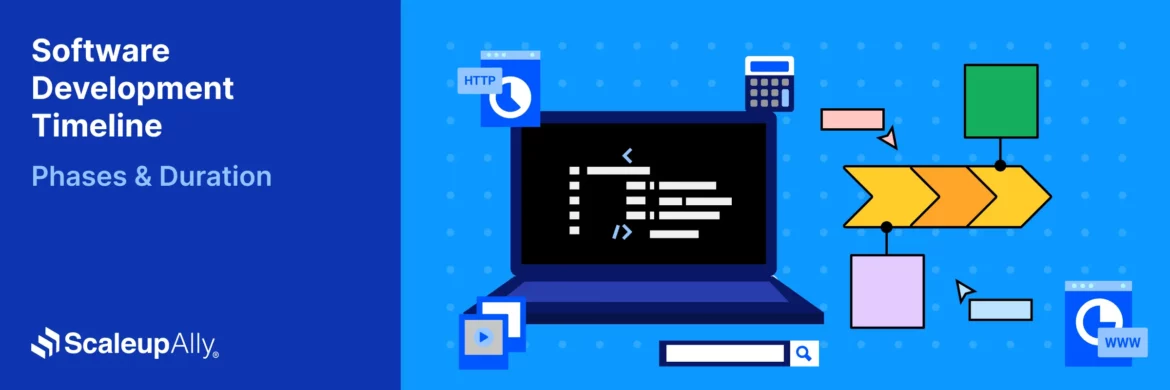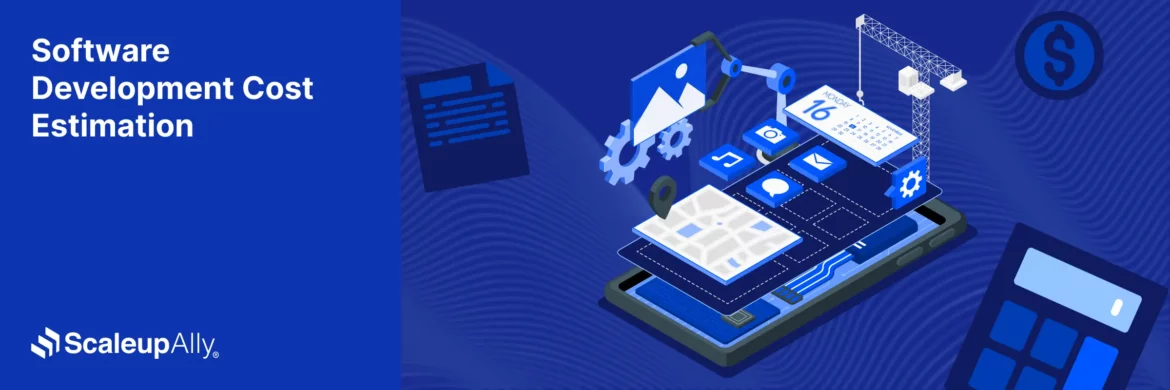
How Long Does It Take To Build a Real Estate Website?
Manu Jain | December 29, 2023 , 10 min read
Table Of Content
Did you know that in today’s fiercely competitive real estate landscape, a strong online presence is the cornerstone of success? A meticulously designed website stands as a potent asset for both seasoned real estate professionals and ambitious entrepreneurs.
Yet, amid the prospect of establishing a digital foothold, a pivotal question persists: ‘How long does it take to build a real estate website?’
This query lingers as a primary concern for those envisioning their place in the digital realm of property dealings.
Key Takeaways
- Development Time Varies by Complexity: Basic websites take days to 3-5 months, moderate sites 6-9 months, and complex platforms 9 months to 1+ year due to features like AI, virtual tours, and CRM integration.
- Key Factors Impacting Timeline: Scope, platform choice, customization, property inventory size, third-party integrations (MLS, CRM), testing, and compliance requirements all influence development duration.
- Web Builders vs. Custom Development: Web builders (e.g., WordPress) offer faster, budget-friendly solutions but limit customization, while custom development provides flexibility at the cost of longer timelines and higher investment.
- Optimization Strategies: Using pre-built templates, prioritizing essential features, and adopting an agile approach can accelerate the development process.
Factors Affecting Development Time of Real Estate Websites
Several factors influence the development time of a real estate website. Understanding these elements is crucial to estimating the timeline accurately:
- Project Scope and Complexity: The complexity of your real estate website significantly impacts the time needed for development. A simple website with basic property listings might take less time compared to a comprehensive platform integrating multiple functionalities like property search, listings, user accounts, mortgage calculators, and virtual tours.
- Platform Selection: Choosing the right platform is pivotal. Utilizing popular content management systems (CMS) like WordPress with real estate-specific themes or opting for custom solutions can affect development time. Pre-built solutions might expedite the process, while custom development could require more time for implementation.
- Customization and Design: The level of customization and intricacy in design can extend the development timeline. Tailoring the website to reflect your brand identity and incorporating user-friendly interfaces, responsive designs, and engaging visuals may lengthen the development process.
- Property Inventory Size and Data Entry: The volume of properties to be listed, along with detailed descriptions, images, and other property-related data, can significantly impact the development time. Handling a smaller inventory is quicker than managing a vast database of properties.
- Integration Needs: Integrating third-party services such as MLS (Multiple Listing Service), property valuation tools, CRM systems, or payment gateways adds complexity and time to the development process, depending on the availability of APIs and compatibility.
- Content Creation: Crafting compelling content for property descriptions, blogs, neighbourhood guides, and visuals like photos and videos is a time-consuming aspect. Ensuring high-quality and informative content is crucial for a successful real estate website.
- Testing and Quality Assurance: Rigorous testing to ensure seamless functionality across various devices and browsers, as well as ensuring data security and user experience, is essential. This phase is time-intensive but vital for a flawless website launch.
- Legal and Compliance Requirements: Meeting legal obligations, such as GDPR compliance, accessibility standards, and industry-specific regulations, may add extra time to the development process.
- Project Management and Resources: The availability and expertise of your development team significantly influence the timeline. Efficient project management, clear communication, and having the right skill sets onboard streamline the process.
Understanding these factors provides insight into the intricate process of building a real estate website. Each element contributes to the overall timeframe required for successful development
How Long Does It Take to Build a Real Estate Website?
Numerous elements converge to determine the duration for constructing a real estate website. By exploring these factors in-depth, one can gain a clearer understanding of the development process.
- Basic Real Estate Website (Timeframe: Days to 3-5 Months)
A straightforward website with property listings, basic search functionalities, and contact forms can be set up quickly using templates or CMS platforms like WordPress. However, customization, data entry, and testing might extend the timeframe to 3-5 months. - Moderate Real Estate Website (Timeframe: 6 to 9 Months)
A mid-level website with more advanced functionalities like property comparison tools, integrated MLS, user accounts, and customized search options may take 6 to 9 months due to increased customization, content creation, and integration needs. - Complex Real Estate Website (Timeframe: 9 Months to 1 Year)
An intricate website with highly tailored features such as AI-driven property recommendations, virtual reality tours, complex CRM integrations, and multiple user roles can take 9 months to a year or more for development and testing.
| Type of Real Estate Website | Timeframe | Features | Examples |
| Basic Real Estate Website | Days to 3-5 Months | Property Listings, Basic Search, Contact Forms | Simple Property Listings Website |
| Moderate Real Estate Website | 6 to 9 Months | Property Comparison, Integrated MLS, User Accounts | Real Estate Marketplace with MLS Integration |
| Complex Real Estate Website | 9 Months to 1 Year+ | AI-driven Property Recommendations, Virtual Reality Tours | National Real Estate Platform with AI Features |
These estimated timeframes offer a comprehensive outlook on the development stages of real estate websites, considering varying complexities and functionalities.
Utilizing E-commerce Web Builders vs. Custom Real Estate Web Development
Similar to e-commerce websites, the choice between using web builders or opting for custom development holds significance in real estate website construction.
E-commerce Web Builders:
Pros:
- Quick setup using templates and predefined functionalities.
- Cost-effective options for those with budget constraints.
- Accessible technical support.
Cons:
- Limited customization capabilities.
- Potential scalability issues as the business expands.
Custom Real Estate Web Development:
Pros:
- Offers limitless customization and scalability.
- Allows seamless integration of complex functionalities.
- Tailors the website to specific business needs.
Cons:
- Longer development timeframe due to customization.
- Higher initial investment is required.
Custom real estate web development empowers businesses with tailored solutions but necessitates meticulous planning and a longer development horizon.
Tips for Speeding Up Real Estate Website Development Process
Opting for custom real estate web development involves a strategic approach, focusing on bespoke solutions tailored to unique business requirements.
To expedite the development process of your real estate website, consider the following strategies:
- Clearly Define Project Scope: Establish a clear project scope and requirements to avoid scope creep and focus on essential features.
- Choose the Right Platform: Select a platform or CMS that aligns with your real estate business needs and offers the necessary functionalities.
- Utilize Templates and Themes: Utilize pre-designed templates or real estate-specific themes to accelerate the design process.
- Prioritize Key Features: Focus on crucial features for the initial launch and add additional functionalities in later phases.
- Streamline Data Entry: Begin with a smaller property inventory and gradually expand, simplifying the initial data entry process.
- Agile Development Approach: Adopt an agile development methodology for iterative progress and launch a minimum viable product (MVP) swiftly. Collaborating with a proven it services company can bring structure to this process and accelerate delivery.
- Efficient Stakeholder Involvement: Ensure active involvement and timely feedback from stakeholders to maintain development pace.
- Continuous Monitoring and Optimization: Implement regular updates and improvements post-launch for optimal performance and user experience.
Continuous improvements post-launch optimize user experience and website performance, ensuring sustained growth.
Conclusion
Constructing a real estate website involves navigating through various intricacies influenced by project scope, customization, platform selection, content creation, and compliance. The timeframe for building a real estate website can range from a few days to over a year, contingent upon the website’s complexity and customization needs.
Choosing between e-commerce web builders and custom development warrants careful consideration, as each approach has its advantages and limitations. Balancing the need for customization against budget and time constraints is pivotal in making an informed decision.
Implementing strategies to expedite the development process, maintaining a clear project scope, and embracing agile methodologies can significantly contribute to launching a successful real estate website within the anticipated timeframe.
Frequently Asked Questions
Q. How long does it take to build a real estate website?
A. The duration varies based on the website’s complexity. A basic website might take days to a few months, whereas a complex one could span over a year.
Q. How can I speed up the development process of my real estate website?
A. Prioritize essential features, choose the right platform, and streamline data entry and stakeholder involvement to expedite development.
Q. Is it better to use an e-commerce web builder or opt for custom development for a real estate website?
A. The decision depends on your specific needs and budget. E-commerce web builders offer quick setups, while custom development provides limitless customization.
Q. What are crucial factors influencing real estate website development time?
A. Factors include project complexity, platform selection, customization needs, content creation, compliance, and efficient project management.
Q. Can a real estate website be launched within a tight budget?
A. Yes, by prioritizing essential features, using templates, and adopting an agile approach, you can launch a real estate website within budget constraints.
In summary, constructing a real estate website demands careful planning, a keen understanding of requirements, and a strategic approach. By navigating through these intricacies efficiently, you can launch a successful real estate website within the anticipated timeframe.
Related Blogs

Top 20 Emerging Technologies of 2026
Discover the top 20 emerging technologies of 2026. Explore which innovations are driving change across healthcare, finance, manufacturing, and other crucial industries.
ScaleupAlly Team
Dec 16 ,
9 min read

Software Development Timeline: Phases, Duration & Estimation Guide
Understand the software development timeline with phase durations, key factors, hidden delays, and practical methods to estimate project time.
Suprabhat Sen
Nov 29 ,
16 min read

Software Development Cost Estimation Guide: What’s Included & What Affects the Price
Explore software development cost components, major pricing factors, and practical estimation methods to plan your project accurately from start to finish.
Suprabhat Sen
Nov 29 ,
14 min read



